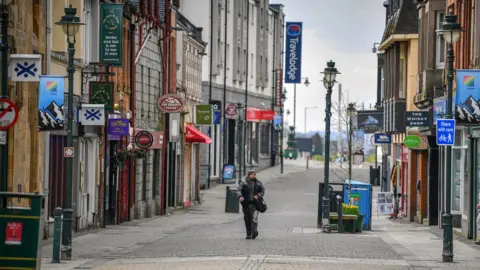Covid in Scotland: Unemployment in Scotland fell slightly in autumn
 Getty Images
Getty ImagesThe number people looking for work in Scotland fell slightly during the autumn, new figures show.
Unemployment dropped by about 1,000 to 123,000 between September and November, during a period when Covid restrictions were eased.
The Office for National Statistics (ONS) reported a 4.4% unemployment rate in Scotland, 0.1% lower than the previous quarter.
The overall UK unemployment rate rose to 5% from 4.9% over the same period.
Meanwhile, the number of Scots in work increased by 26,000.
The employment rate for ages 16 to 64 was 74.4%, up 0.5% on the previous three months.


The Scottish jobs market showed resilience during the autumn months, according to the latest figures.
With Covid infection restrictions eased for many between September and November, the number of Scots seeking work fell by 1,000.
Yet, the unemployment figure for the UK as a whole was up by 202,000. So while the Scottish unemployment rate fell one notch to 4.4%, the UK rate was up 0.6% percentage points to 5%.
There was a drop in the number of people replying to the Labour Force Survey questionnaire that they were not seeking work during September, October and November.
In Scotland, that was down 17,000 to 760,000. Most of these people are either in family caring roles, full-time students or they have long-term illness.
The extent of difficulty in the labour market is not showing up in these monthly figures. The Bank of England believes the real unemployment rate is closer to 7.5%.
It is being masked by UK government income support schemes, mainly furlough but also payments to some self-employed people.
An indication of change is the estimate of Scots claiming benefit because they were out of work in December or working but on low income, sometimes with reduced hours. That rose by 84% during last year, to 211,000, but it was down by 1,400 since November.
A further indicator is the number of Scots in payrolled employment, not including the self-employed. That number was down by 67,000 during last year, a 2.8% drop to 2.3 million.
The figures, from HM Revenue and Customs, say that rose by 9,000 between November and December - the first monthly increase since July.

The Fraser of Allander economic institute said the latest data continued to present "quite a different picture of the health of the economy and labour market than what we are all experiencing in real time".
Head of research Stuart McIntyre said: "Scratch below the surface of the headline data and we can see real and widespread challenges emerging.
"From nearly 100,000 more people in Scotland claiming unemployment related benefits than before the pandemic, to the nearly nine million fewer hours being worked each week in Scotland compared to a year ago.
"And remember that nearly 200,000 jobs were still furloughed in Scotland at the end of October, down from 500,000 in July, but still representing over 7% of all jobs in Scotland."
He added: "Whilst the beginning of a shakeout in the labour market is already under way, by far its largest impacts will be realised when the furlough scheme finally closes, currently scheduled for the end of April this year.
"What measures are put in place to support those who do not return to their old job when they come off furlough, alongside what measures are taken to stimulate the economy, will be key to how large and persistent the subsequent unemployment crisis becomes."
Responding to the latest data, Scottish government Business Minister Jamie Hepburn said: "These figures still do not reflect the full impact of coronavirus or outlook for employment, as the Job Retention Scheme continues to play an important role in supporting employers and employees.
"Combined with the huge economic uncertainty caused by Brexit, this remains an extremely uncertain time for the economy and jobs."
'Precarious condition'
Andrew McRae, from the Federation of Small Businesses in Scotland, said the figures showed that the furlough scheme, and other government interventions to keep people in jobs, had "mostly worked so far".
He added: "They tell us little about the precarious condition of the economy or the Scottish business community."
CBI Scotland director Tracy Black said that while Scotland continued to buck the national trend with further employment growth, businesses and households were "still bearing the brunt of the pandemic".
She added: "The continuation of lockdown restrictions makes it ever more urgent that the UK and Scottish governments do everything they can to protect jobs and livelihoods.
"The Job Retention Scheme needs to run to at least the end of June to avoid a cliff edge."
Chancellor Rishi Sunak said: "This crisis has gone on far longer than any of us hoped and every job lost as a result is a tragedy.
"Our Plan for Jobs includes grants and loans so that firms can keep employees on, the furlough scheme to help protect jobs, and programmes like Kickstart alongside record investment in skills."
